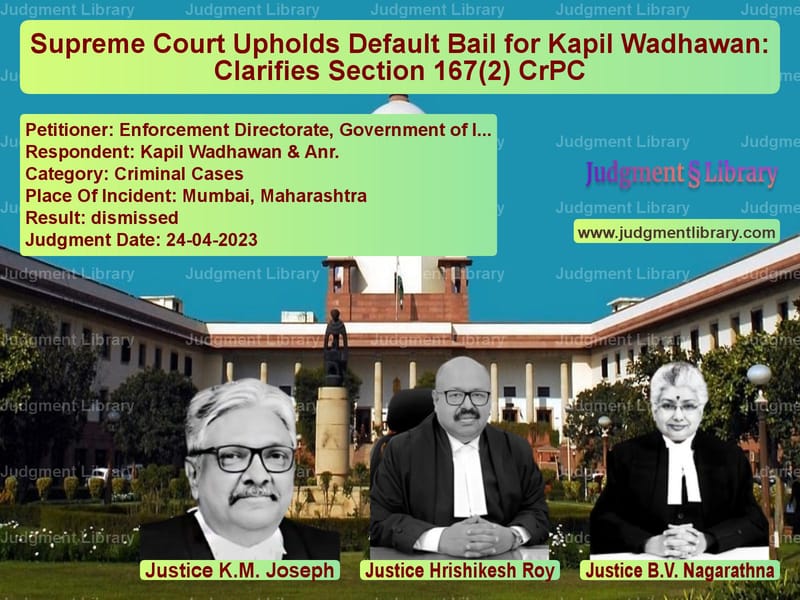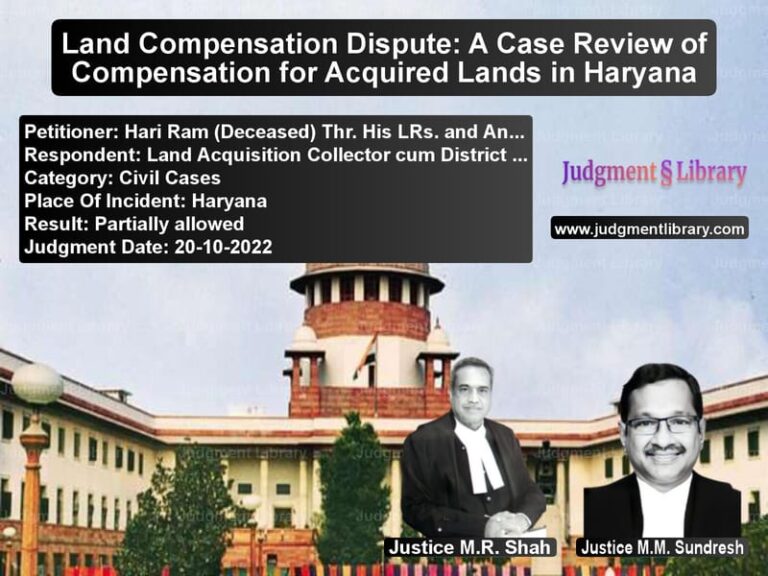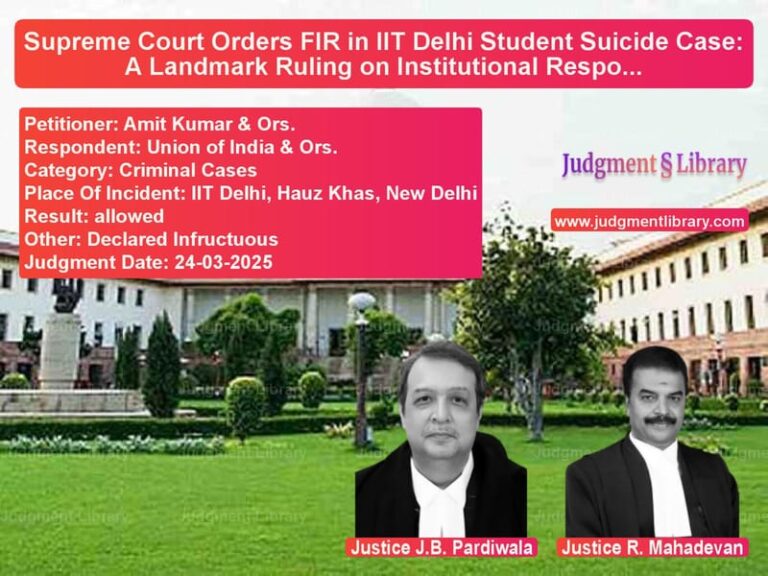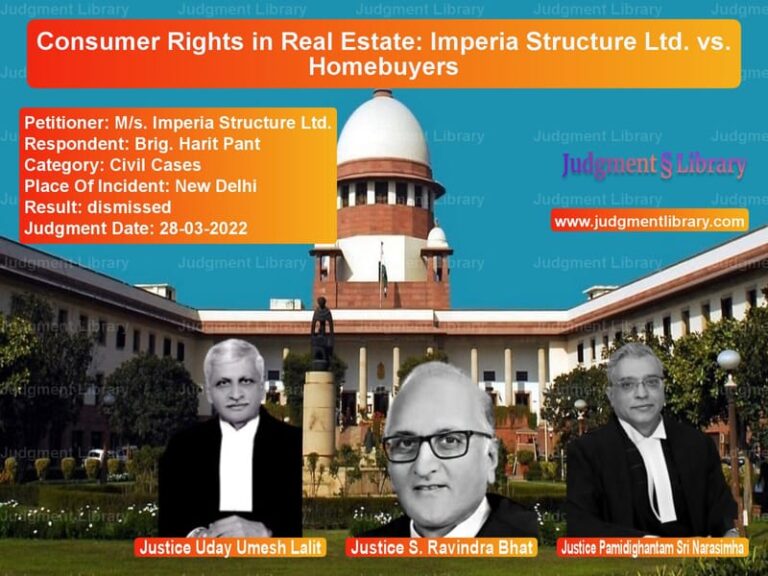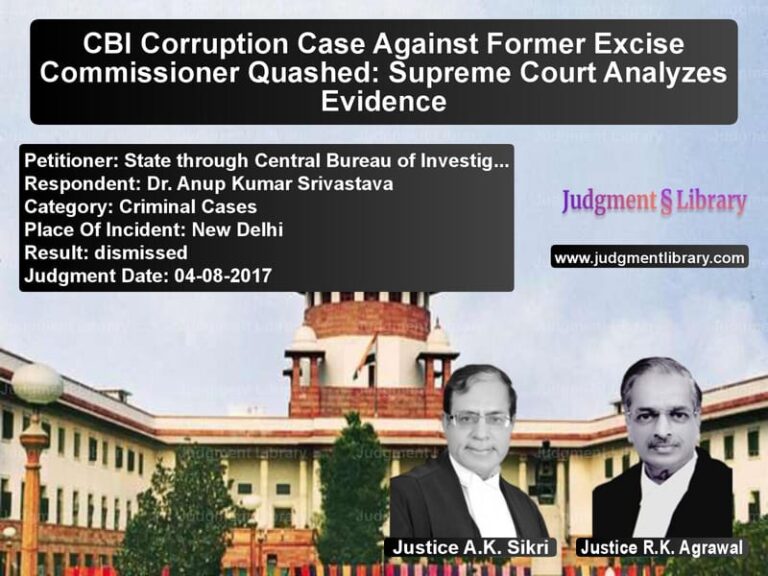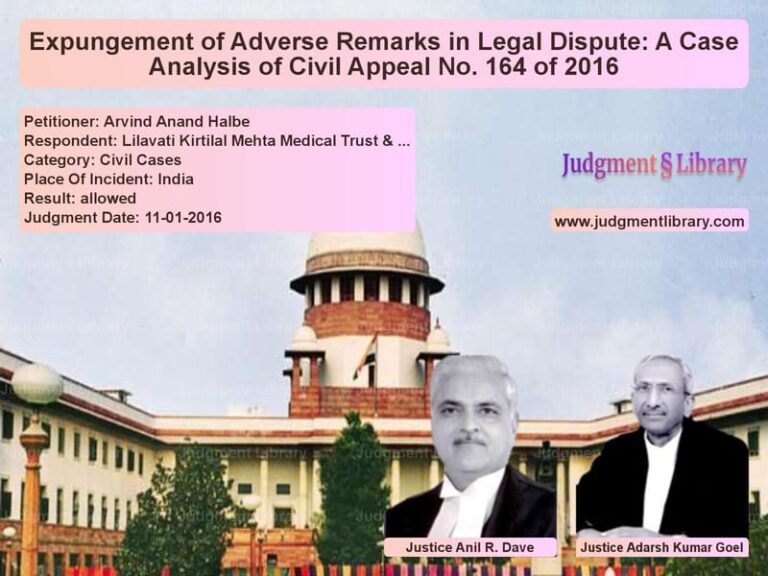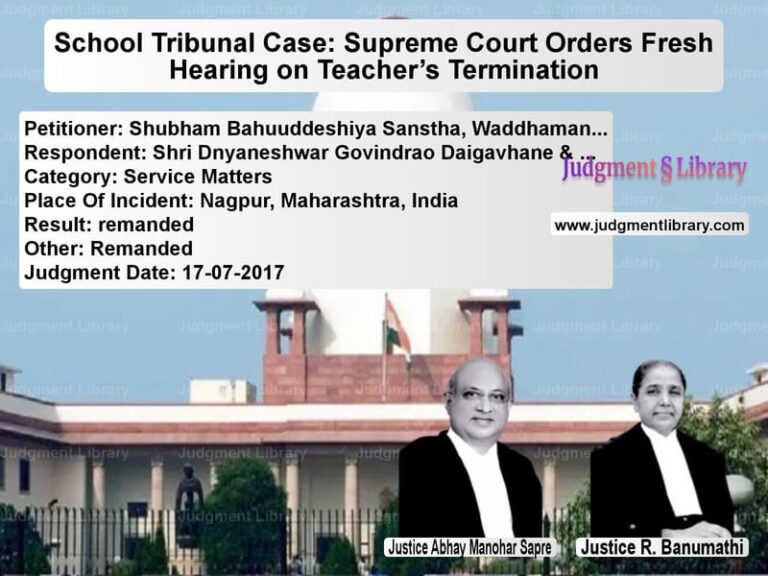Supreme Court Upholds Default Bail for Kapil Wadhawan: Clarifies Section 167(2) CrPC
The Supreme Court of India recently delivered a crucial ruling in the case of Enforcement Directorate vs. Kapil Wadhawan & Anr., clarifying the application of default bail under Section 167(2) of the Code of Criminal Procedure (CrPC). The case revolved around the interpretation of the High Court’s decision to grant bail and whether the Supreme Court’s earlier judgment required further clarification.
Background of the Case
The case concerns Kapil Wadhawan, former chairman of Dewan Housing Finance Corporation Ltd. (DHFL), who was arrested in connection with a money laundering investigation by the Enforcement Directorate (ED). The probe was linked to alleged financial irregularities involving DHFL and its transactions with Yes Bank.
Key developments in the case include:
- On March 7, 2020, Wadhawan was arrested by the ED under the Prevention of Money Laundering Act (PMLA).
- On August 20, 2020, the Bombay High Court granted him default bail under Section 167(2) CrPC, ruling that the prosecution failed to file a chargesheet within the prescribed time.
- The ED challenged this decision before the Supreme Court, arguing that default bail was granted improperly.
- On March 27, 2023, the Supreme Court upheld the High Court’s decision but referred certain legal questions to a larger bench.
- Subsequently, the ED filed an application seeking clarification of the judgment.
Legal Proceedings
Arguments by the Enforcement Directorate
The ED, represented by Additional Solicitor General S. V. Raju, contended:
- The Supreme Court’s ruling should be clarified to specify that it only resolved the referred legal issue and did not validate the High Court’s order in its entirety.
- The default bail order should not be considered conclusive, as other legal aspects remain pending.
- The case involved serious financial crimes under PMLA, necessitating stricter judicial scrutiny.
Arguments by the Respondents
Senior Advocates Mukul Rohatgi and Kapil Sibal, representing Wadhawan, argued:
- The High Court’s order granting default bail was legally sound and aligned with established precedents.
- The Supreme Court’s March 27 ruling already upheld the High Court’s decision.
- Seeking further clarification was an attempt to delay Wadhawan’s release.
Supreme Court’s Observations
The Supreme Court bench, comprising Justices K.M. Joseph, Hrishikesh Roy, and B.V. Nagarathna, ruled in favor of the respondents and dismissed the ED’s clarification plea.
Key Observations:
- “The impugned order of the High Court granting default bail to the respondents by applying the proviso (a)(ii) of Section 167(2) CrPC is found to be in order.”
- “Any other pending issues arising from these appeals are to be addressed by an appropriate Bench of this Court.”
- “We uphold the impugned judgment dated 20.08.2020 passed by the learned Single Judge of the Bombay High Court.”
Final Judgment
The Supreme Court ruled:
- The clarification application by the ED was dismissed.
- The High Court’s order granting default bail to Wadhawan remained valid.
- Any other legal issues in the case would be decided by a different bench.
Implications of the Judgment
This ruling has significant implications for the interpretation of Section 167(2) CrPC and default bail:
- Reaffirmation of Default Bail: The judgment upholds the right of an accused to seek default bail if the prosecution fails to file a chargesheet within the statutory period.
- Limited Scope of Clarification Applications: The ruling prevents misuse of clarification pleas to challenge final orders indirectly.
- Judicial Protection in Financial Crimes: While financial offenses require rigorous scrutiny, procedural rights of accused persons cannot be overlooked.
Conclusion
The Supreme Court’s ruling in Enforcement Directorate vs. Kapil Wadhawan & Anr. reaffirms the fundamental principle of default bail under CrPC while limiting unwarranted judicial clarifications. By dismissing the ED’s application, the Court has upheld the High Court’s decision, reinforcing procedural safeguards for accused individuals under India’s criminal justice system.
Petitioner Name: Enforcement Directorate, Government of India.Respondent Name: Kapil Wadhawan & Anr..Judgment By: Justice K.M. Joseph, Justice Hrishikesh Roy, Justice B.V. Nagarathna.Place Of Incident: Mumbai, Maharashtra.Judgment Date: 24-04-2023.
Don’t miss out on the full details! Download the complete judgment in PDF format below and gain valuable insights instantly!
Download Judgment: enforcement-director-vs-kapil-wadhawan-&-anr-supreme-court-of-india-judgment-dated-24-04-2023.pdf
Directly Download Judgment: Directly download this Judgment
See all petitions in Bail and Anticipatory Bail
See all petitions in Money Laundering Cases
See all petitions in Judgment by K.M. Joseph
See all petitions in Judgment by Hrishikesh Roy
See all petitions in Judgment by B.V. Nagarathna
See all petitions in dismissed
See all petitions in supreme court of India judgments April 2023
See all petitions in 2023 judgments
See all posts in Criminal Cases Category
See all allowed petitions in Criminal Cases Category
See all Dismissed petitions in Criminal Cases Category
See all partially allowed petitions in Criminal Cases Category

